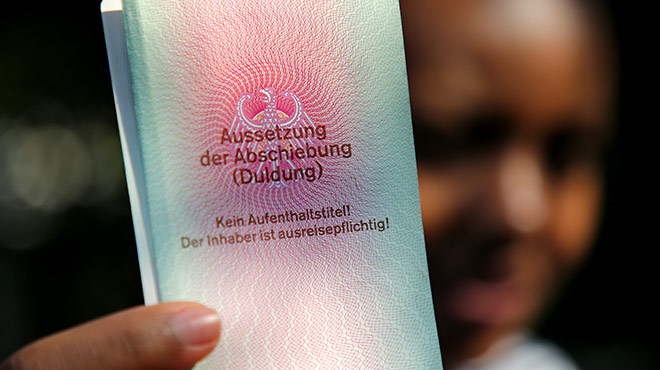News
FAQ: Questions and answers about the Opportunity-Residence-Act (Chancen-Aufenthaltsrecht)

The Opportunity-Residence-Act (§ 104c AufenthG) came into force on 31.12.2022. This means that it can be applied for immediately. The Opportunity-Residence-Act is valid for three years, so it can be applied for up to and including 30.12.2025.
How and where can I apply for the Opportunity-Residence-Act?
The Opportunity-Residence-Act must be applied for at the responsible foreigners authority (»Ausländerbehörde«). We recommend submitting a written application.
Who can get the Opportunity-Residence-Act?
First, the person must be tolerated (the Person must have a Duldung) at the time of application. The person must have lived in Germany without interruption for five years after 31.10.2017 with a Duldung, Aufenthaltsgestattung or residence permit (Aufenthaltserlaubnis). Periods with a »Duldung light« are also counted towards these five years. In addition, a commitment to the free democratic basic order is required. More detailed information on these requirements can be found in our advice notes (in German).
It is not necessary to have a job, a passport and a proven identity or citizenship and language skills.
Who is excluded from the Opportunity-Residence-Act, even if the person meets the requirements?
People who have been sentenced to imprisonment or fines of more than 50 daily rates (90 daily rates for crimes that can only be committed by foreigners under the Residence Act or Asylum Act, such as entering and staying in Germany without a passport or residence permit) are excluded. This would also apply to young people sentenced under juvenile criminal law to a suspended prison term or to a juvenile detention center.
Juvenile detention in its various forms and other sentences under juvenile criminal law must be distinguished from juvenile punishment. These may not lead to the denial of the Opportunity-Residence-Act.
The Opportunity-Residence-Act shall also be denied if someone has repeatedly and intentionally provided false information or deceived about identity or nationality and thereby prevented deportation. It is no ground for exclusion if a person has not cooperated in obtaining a passport or has not removed obstacles to deportation.
Does the Opportunity-Residence-Act also apply to family members of eligible persons, even if the family members have not yet lived in Germany for five years?
Yes, spouses or registered life partners as well as underage children living in the same household as eligible persons should be granted the Opportunity-Residence-Act, even if they have not yet lived in Germany for five years – as long as they meet the other requirements. Unmarried children who are of full age can also be granted the Opportunity-Residence-Act if they were minors when they entered Germany and continue to live in the same household as the person who is entitled to the Opportunity-Residence-Act.
What status do people get who receive the Opportunity-Residence-Act?
Those who fulfill the requirements of the Opportunity-Residence-Act receive a residence permit valid for 18 months, with which work – both dependent employment with an employer and self-employment – is permitted. It is also possible to travel abroad if you already have a valid passport.
What do people have to do during the 18 months in order to continue to receive a residence permit afterwards?
In order to obtain a residence permit in Germany beyond the 18 months, those affected should use the time to fulfill the requirements for the right of residence for well-integrated adolescents and young adults (§ 25a AufenthG) or for the right of residence for sustainable integration (§ 25b AufenthG). As a rule, however, the identity should be clarified and a valid native passport should be available.
What status can people get after the Opportunity-Residence-Act?
After the Opportunity-Residence-Act, but also before the 18 months have expired, people can change to a right of residence if they meet the respective requirements: to the right of residence for well-integrated adolescents and young adults (between the ages of 14 and 27, Section 25a of the Residence Act) or to the right of residence for adults with sustainable integration (Section 25b of the Residence Act). The persons would then have a residence permit for a longer stay.
If people do not meet the requirements, the law currently provides for a reversion to toleration. But even in these cases, other residence security options may still be considered.
Since an intensive consideration of all possibilities under residence law for persons with Duldung should take place in every case constellation, these FAQs and our counseling tips cannot replace intensive individual case counseling of affected persons.
(ja, ie, wr, pva)
translated with deepl.com